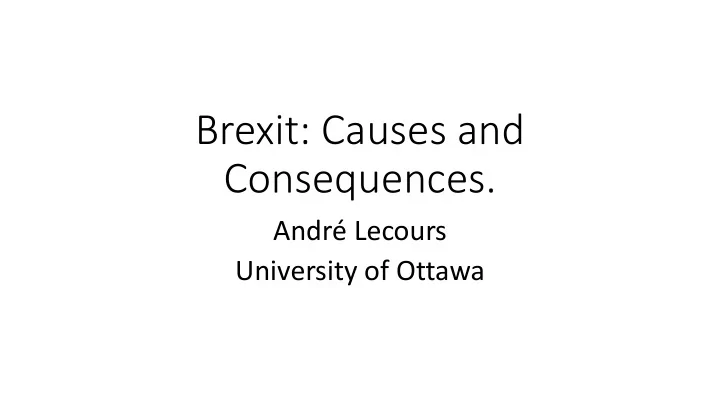

Brexit: Causes and Consequences. André Lecours University of Ottawa
EU Member States
The European Union • The Treaty of Rome (1957): peace, prosperity, and democracy in Europe. • The first enlargement (1973): United Kingdom, Ireland, Denmark. • The second enlargement (1981): Greece. • Third enlargement (1986): Spain and Portugal. • Treaty on the European Union (1992, Maastricht): freedom of movement for people, goods, services and capital. • The common currency (Euro, 1999) with some exceptions.
The European Union • The fifth enlargement (2004): Slovakia, Czech Republic, Poland, Hungary, Slovenia, Latvia, Lithuania, Estonia, Malta, Cyprus. • Failure of the European Constitution project (2005). • The sixth enlargement (2007): Romania and Bulgaria. • The financial crisis (2008). • The migration crisis (2010- …) • The seventh enlargement (2013): Croatia. • The Brexit crisis!
The United Kingdom: a Multinational State.
The United Kingdom • England. • Wales: 1535. • Scotland: 1707. • Ireland: 1800. • Northern Ireland (only): 1921 • The United Kingdom of Great Britain and Northern Ireland. • The principle of parliamentary sovereignty. • Liberalism stronger than socialism.
The UK-EU relationship. • The 1960s and General de Gaulle’s veto: the UK too ‘ atlanticist ’. • The 1980s and 1990s: the British exceptions (social charter, euro, rebate). • Thatcherism and the EU. • The Conservative Party divided on the EU. • Labour and the Liberal-Democrats in support of the EU.
Brexit: Background and Causes • The United Kingdom Independence Party (UKIP) • The promise of Prime Minister David Cameron: 2013. • The Conservative victory at the 2015 elections. • The referendum (2016): ‘Leave’ and ‘Remain.’ • The UK Conservative government supports ‘Remain’. • The arguments for ‘Leave’: the EU’s democratic deficit; bureaucracy and the EU; immigration and border control.
Brexit: Background and Causes • The arguments for ‘Remain’: the economic benefits of the European single market (and thus the economic risks of Brexit: job losses and economic slowdowns); arguments supported by the business sector; loss of influence for the UK in the world. The result: 51.89% for ‘Leave’. • The result in the nations of the UK: - England: 53.38% for ‘Leave. - Wales: 52.53% for‘Leave.’ - Northern Ireland: 55.78% for ‘Remain’ - Scotland: 62% for ‘Remain’
The Consequences of the vote for Brexit • Brexit with or without a deal? - March 2017: the UK government invokes article 50 of the Treaty of Lisbon on the exit of a member state from the EU. - A general election is called by Prime Minister Theresa May. The Conservatives lose their majority. - The UK government and the EU negotiate an exit agreement, which the UK Parliament refuses to approve (3 times).
The Consequences of the vote for Brexit - The most controversial element of these deals was the ‘Irish backdrop,’ which would keep Northern Ireland and the Republic of Ireland (thus the UK and the EU) border-free. -New Prime Minister Boris Johnson announces he will prorogue Parliament (in the hope that the UK leaves the EU with or without a deal). - Several Conservative MPs leave the caucus. - Parliament adopts a law stipulating the UK government should ask for another extension from the EU in case there is no exit agreement. - The UK Supreme Court rules prorogation is illegal.
The consequences of the vote for Brexit • The Irish question: is peace in danger? • The Scottish question: another independence referendum? • The British political system. • The British party system. • The future of the UK outside of the EU. • The future of the EU without the UK.
Recommend
More recommend